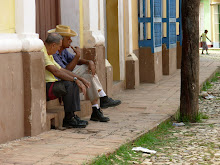Ok fine, let’s get back to it.
The end of the wet foot-dry foot policy ends Cubans’ status
as the chosen people of U.S. immigration policy.
Until yesterday, they were admitted when they show up at the
border with no visa, put on a path to legal permanent residency, and given a
package of free government benefits (Medicaid, food stamps, education
assistance) that no other nationality gets.
If you like the idea
of a fair and even-handed immigration policy – something that I as a fan of
legal immigration think we should maintain – this change is long overdue. Cubans,
few of whom come here as refugees, had no reason to receive that package of
federal benefits that is intended for refugees. And Cubans who intend to
immigrate will now have to do so through the processes and timetables that
apply to everyone else.
Here’s the joint
announcement of the two governments, the Obama
statement, a Cuban foreign ministry press
conference, and a Homeland Security fact
sheet.
This is not the end
of Cuban immigration, far from it. The U.S. commitment under the 1994/1995
immigration accords to issue 20,000 immigrant visas each year remains in
effect, and we could do more. Cubans have the rare opportunity to apply for
refugee status in the U.S. consulate in Havana (which amounts to a few hundred
per year), they can apply elsewhere if they are outside Cuba, and they can seek
asylum at the U.S. border.
Yesterday’s
announcement may not even end all illegal immigration by Cubans. Yes, those who
show up at the border will be returned. But there are other groups: those who
arrive with visas and overstay, then seek legal permanent residency; or those
Cubans who acquire Spanish citizenship, enter on a Spanish passport, then seek
legal permanent residency. The Cuban Adjustment Act remains on the books and still
allows the executive to “adjust” the status of Cubans who have been on U.S.
soil for one year by giving them permanent residency. Yesterday’s announcement
was silent on this question.
The Administration’s announcement drew a hoary condemnation from Senator Menendez (it
will “tighten
the noose the Castro regime continues to have around the neck of its own
people”).
But it’s surprising
that those who support the embargo as an instrument of pressure on the Cuban
people and the Cuban government do not support this step. If your goal is to
apply pressure to force political change, it makes no sense to maintain an
open-door immigration policy that invites dissatisfied Cubans to get up and
leave.
The new policy is
good for U.S. border security, because it will stem a flow of tens of thousands
of illegal migrants per year and likely free up enforcement resources. It is
good for countries from Ecuador to Mexico that have had to care for these
migrants. And inside Cuba, it certainly puts a greater onus on the government
to press ahead with economic reforms – those on the books now, and perhaps new
ones – that can create jobs for those who have been leaving Cuba in search of
basic economic opportunities.
As for the incoming Trump Administration, its views on this
are anyone’s guess. But candidate Trump did address the issue in an
interview last February. When asked if the special treatment for Cuban
migrants is justified, he responded: “I don’t think that’s fair. I mean, why
would that be a fair thing? … You have people that have been in the system for
years [waiting to immigrate to America], and it’s very unfair when people who
just walk across the border, and you have other people that do it legally.”
Sounds like Obama
did him a favor.





No comments:
Post a Comment